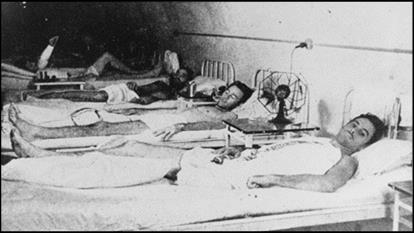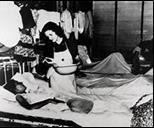 The nurses fought to stay with their patients as much as possible but the prevailing attitude regarding women meant that the leadership often moved them to protected, safe areas instead of letting them treat the wounded. The fair sex had to be safeguarded. Davidson fought hard for her nurses and in many cases, they did manage to treat the wounded and sick in the internment camps.
The nurses fought to stay with their patients as much as possible but the prevailing attitude regarding women meant that the leadership often moved them to protected, safe areas instead of letting them treat the wounded. The fair sex had to be safeguarded. Davidson fought hard for her nurses and in many cases, they did manage to treat the wounded and sick in the internment camps.
Despite all the pain, suffering and trauma they endured, little official recognition came their way. Between February of 1945, when the liberation of the Philippines began, to the surrender of Japan on August 15, 1945, the nurses began the repatriation process. They were marched in front of the media and the American public as “feel good propaganda” at a time when good news was needed, but official recognition was scarce. Several colleagues and military brass wanted Major Maude Campbell Davidson recognized for her sacrifice and heroism, representative of the bravery of so many of the women.
General MacArthur wrote: “Major Davidson in her capacity as Chief Nurse, Philippine Department and subsequently chief nurse United States army in the Philippines was a leader and symbol of the entire nursing corps which so distinguished itself throughout the Philippines Campaign. Her performance was outstanding and an example to all. The standards set by her and through her corps establish a precedent not only within a gallant forces of Bataan but for the entire nursing or in our army in all theaters.”
However, when General Wainwright was asked for his support he said, “In my opinion the position of Chief Nurse, although very important, is not one of great responsibility within the meaning of the qualification of the Distinguished Service Medal. I recommend the award of the Legion of Merit to Major Maude C. Davidson.” The Legion of Merit being the lesser in recognition.
No one survives war without luck according to Norman. More important than luck, courage, determination and camaraderie were significant factors in motivating these women to help their fellow human beings survive. A plaque dedicated by survivors of the Death
March atop a hillside in Bataan reads:
“In honor of the valiant American military women who gave so much and of themselves in the early days of World War II….they lived on a starvation diet, shared the bombing, strafing, sniping, sickness and disease while working endless hours of heartbreaking duty……. they truly earned the name “The Angels of Bataan and Corregidor.”
Perhaps this heartfelt and sincere gesture is a more meaningful recognition than a medal. However, in 2001, Davidson was posthumously recognized with the Distinguished Service Medal, due to the efforts of the surviving “Angels” such as Brigadier General Connie L. Slewitzke, Senator Daniel Inouye, and many others.(Riegler)
Sources:
Riegler, Natalie (2000) “Maude Campbell Davison 1885 - 1956”. American Association for the History of Nursing. Wheat Ridge, Colorado. Archived from the original on 22 March 2016. Retrieved 30 September 2020.
